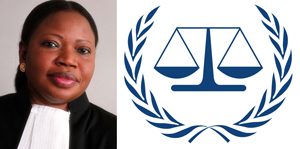Is African head of International Criminal Court a sham?
By Saeed Shabazz -Staff Writer- | Last updated: Jan 1, 2012 - 11:27:52 AMWhat's your opinion on this article?

Fatou B. Bensouda
|
Ms. Bensouda was overheard in a UN corridor telling a reporter that her experience inside the court, where she served as deputy prosecutor since 2004, was the key element in her new appointment. It is important to the court that “continuity” be maintained, she said.
The veteran jurist told reporters she “disagreed” with the notion that the court was “targeting” Africa or African leaders. “We should not think of it as targeting leaders,” Ms. Bensouda said. The ICC is working for Africa and with African leaders, she insisted, adding, “We will target the perpetrators of the crimes and continue to work with victims in Africa and outside Africa.”
Ms. Bensouda began as a counsel in Gambia and rose in 13 years to become attorney general and minister of justice. In 2000 she became an international jurist, taking part in the International Criminal Tribunal for Rwanda.
The reason the ICC has been charged with disproportionately targeting African leaders stems from the fact that only Africans are the subjects of ongoing investigations. To date 25 individuals have open cases pertaining to alleged crimes in six African nations: Libya, Kenya, Sudan (Darfur), Uganda (The Lord’s Resistance Army), the Democratic Republic of the Congo, the Central African Republic and Cote d’Ivoire. Investigations are also underway in Guinea and Nigeria, according to ICC records.
Some observers say Ms. Bensouda’s appointment is just what the ICC needs to revive its reputation on the African continent. Some African nations had also demanded that the next chief prosecutor come from Africa.
A Deputy Justice Minister in South Africa applauded the Dec. 12 appointment, according to reports, saying the selection was significant in light of the ongoing investigations and prosecutions relating to crimes committed in Africa.
“Now that there is a Black woman appointed to head the ICC it will make no difference in how the court conducts its business against African leaders,” said Attorney Roger Wareham of the Brooklyn-based December 12th Movement and Secretariat, which works on international issues and lobbies the UN.
Her appointment must be seen as a “preemptive move” to deflect criticism of the double standard in the international justice process, he added.
“I think the ICC knows it has an image problem, because it has focused merely on the criminality of African leaders, while dismissing the criminality of White leaders, which is greater,” Mr. Wareham said.
The most often heard criticism of the ICC’s first chief prosecutor Luis Moreno-Ocampo, an Argentinean was that the court remained too close to the positions of the major Western powers, particularly the U.S. A reporter for the Los Angeles Times during a November interview asked Mr. Moreno-Ocampo to respond to the criticism that the ICC was “picking on Africa.”
“This comes from (Sudanese President Omar) al-Bashir; this is propaganda,” Mr. Moreno-Ocampo said. “We don’t ignore African victims because they are African. If the killers are African, I will prosecute them.” President Al-Bashir of Sudan is wanted on a 2009 ICC warrant for three counts of genocide and five counts of crimes against humanity committed in Darfur. The African Union has forbidden its member states from executing the warrant.
“We have only moved based on the legal limits that we have under the Rome Statute,” Ms. Bensouda told reporters.
The ICC, also known as the Rome Statute, is a legally binding treaty between nations created in 1998 in Rome, Italy, and entered into force on July 1, 2002. It established a permanent, independent court to investigate and bring to justice individuals who commit war crimes, crimes against humanity, and genocide. The United States is not a party to the Rome Statute.
Some international law experts say the relationship between the UN and the ICC is cause for concern.
Although not a UN body, the ICC through the Rome Statute provides that the court may be forced to take certain situations into account by the UN Security Council and that the Security Council may, in effect, block certain prosecutions.
The U.S. action in the Security Council in pushing for the warrants against the assassinated president of Libya, Col. Muammar Gadhafi and his son, Seif al-Islam Gadhafi; and its refusal to allow for an indictment against Israel for alleged crimes against humanity directed at the Palestinian people, are examples, say experts of how the UN violates the Regulations of the Office of the Prosecutor adopted in 2009.
These regulations say, “the Prosecutor shall ensure that the Office and its members maintain their full independence and do not seek or act on instructions from any external source.”
Some observers say efforts by the ICC and its prosecutor in issuing the warrants against Libyan officials, and its inaction against Israeli officials, raise questions about the impartiality, integrity, independence and competence of the ICC to contribute to international justice.
“Africans being persecuted has been the problem at the UN since its inception of the UN; and the appointment of an African to head the ICC replicates the UN’s heavy-handed attempt to disguise its racism,” Mr. Wareham said.
Related news:
ICC and Africa: selective justice (NewAfrican, 2009)
INSIDE STORIES AND REVIEWS
-
-
About Harriett ... and the Negro Hollywood Road Show
By Rabiah Muhammad, Guest Columnist » Full Story -
Skepticism greets Jay-Z, NFL talk of inspiring change
By Bryan 18X Crawford and Richard B. Muhammad The Final Call Newspaper @TheFinalCall » Full Story -
The painful problem of Black girls and suicide
By Charlene Muhammad -National Correspondent- » Full Story -
Exploitation of Innocence - Report: Perceptions, policies hurting Black girls
By Charlene Muhammad -National Correspondent- » Full Story -
Big Ballin: Big ideas fuel a father’s Big Baller Brand and brash business sense
By Bryan Crawford -Contributing Writer- » Full Story






 Click Here Stay Connected!
Click Here Stay Connected!








